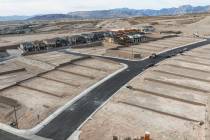Lobbyist group aims to reform HOA fee collection process
A lobbyist group has taken up the fight against exorbitant HOA collection fees that illegally threaten homeowners with foreclosure and negatively impact Nevada consumers, coalition leaders said Tuesday.
Homeowners association residents have seen $200 in delinquent dues turn into a $5,000 bill through collection companies, an unrealistic expectation for people struggling to pay their mortgage in the first place, broker Joseph Eaton said at a meeting with Review-Journal editorial staff.
"They file a delinquent assessment and threaten to take your property, but they have no intent to foreclose. That violates federal law, which is an act known as Fair Debt Collection Practices," Eaton said.
Concerned Homeowners Association Members PAC, or CHAMP, was formed to represent the interests of individuals and entities in reining in what they consider an unregulated and egregious HOA collection process.
Collection agencies, often in tandem with community association management firms, rack up $50 million to $100 million in collection fees every year, Rutt Premsrirut of Valtus Real Estate said.
"You have a homeowner in default and a couple hundred dollars ends up being $5,000," he said. "These collectors run up fees and hardly ever take it to sale. They wait until Freddie (Mac) or Fannie (Mae) forecloses. You have to ask, 'Who's left holding the bag?' The homeowners."
Guidelines for Freddie Mac and Fannie Mae state that they will not lend in states that allow HOA collection fees beyond six months. Nevada statute allows for nine months of back due fees, but HOA collectors are illegally going around the law and have been able to churn out significantly more fees, none of which go back to the HOA, Premsrirut said.
Once a homeowner's file is turned over to an HOA collection company, the fees start adding up , said Eddie Haddad, who buys and sells foreclosed homes.
An example of fees charged by Nevada Association Services included $308 in assessments; $270 for the demand letter; $325 for notice of lien; $400 foreclosure fee; $300 title report; $152 postage; $250 escrow demand; $175 to the management company; $175 transfer fee; and $325 on the second lien. In all, the bill came to $3,140.
Premsrirut said CHAMP is working on a couple of proposed bills in the Legislature, one of which is a modification of a failed bill by former Assemblywoman Barbara Buckley on collection fees.
Deborah Ogilvie, principal of Terra West property management, said HOAs must rely on collection agencies to collect legitimate assessments.
"You know how impactful it would be to any HOA unable to collect the owed assessments on a property -- whether owned by a homeowner or a bank trying to complete a sale to an investor -- to maintain financial solvency if they don't have the superpriority (lien) status," Ogilvie wrote in an e-mail. "It isn't the superior status that is the problem. It is that some of the assessment collection companies have charged egregious fees."
Leslie Carver of Prudential Americana Group said the cap on fees -- whether it's six months or nine months -- doesn't kick in on short sales, or sales that require lender approval.
"That causes the whole deal to fall out over $50 a month," she said. "Times 12 months, that's $600, not $10,000. That forces a home into foreclosure because nobody can deal with $10,000."
Contact reporter Hubble Smith at hsmith@reviewjournal.com or 702-383-0491.

















